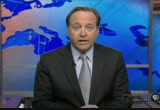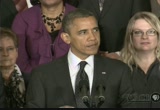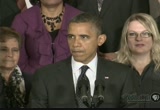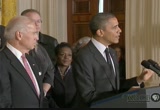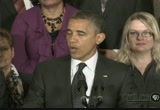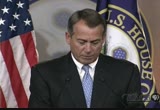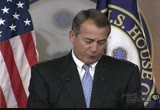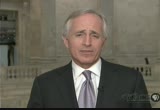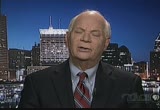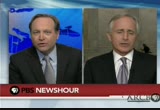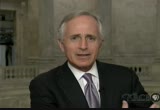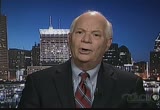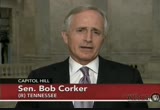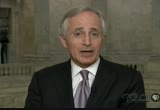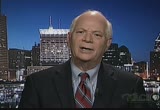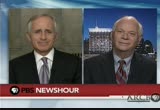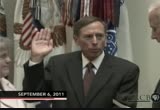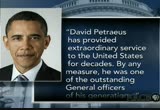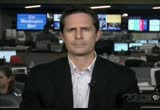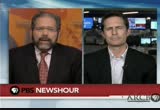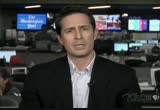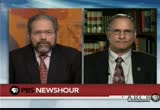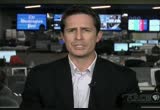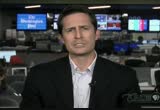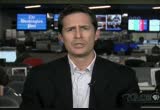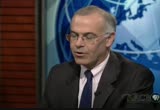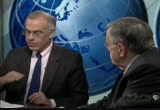tv PBS News Hour PBS November 9, 2012 10:00pm-11:00pm PST
10:00 pm
captioning sponsored by macneil/lehrer productions >> woodruff: president obama addressed the looming fiscal crisis for the first time since the election, and insisted once again he won't accept a deal unless it includes higher taxes on the wealthy. good evening. i'm judy woodruff. >> brown: and i'm jeffrey brown. on the newshour tonight, we'll have excerpts from the president's remarks, and our own debate on the economic challenges ahead with two senators, maryland democrat ben cardin and tennessee republican bob corker. >> woodruff: then, ray suarez has the latest on the surprise
10:01 pm
resignation of cia chief david petraeus after admitting to an extra-marital affair. >> brown: it's still cold and dark in many new jersey homes. special correspondent rick karr follows utility crews as they work to turn the electricity back on. >> access to these lines is quite difficult, cutting through peoples' backyards. you may come in one and cross four other yards just to get to your job site. >> woodruff: plus mark shields and david brooks analyze the week's news. that's all ahead on tonight's newshour. >> major funding for the pbs newshour has been provided by:
10:02 pm
intel >> music is a universal language. but when i was in an accident, i was worried the healthcare system spoke on with all its own. with united healthcare, i got help that treat my life, information on my phone, connection to doctors who get where i'm from, and tools to estimate what my care may cost. so i never missed a beat. >> we're more than 78,000 people looking out for more than 70 million americans. that's health in numbers. united healthcare. >> and by the bill and melinda gates foundation. dedicated to the idea that all people deserve the chance to live a healthy, productive life. and with the ongoing support of these institutions and foundations. and...
10:03 pm
this program was made possible by the corporation for public broadcasting. and by contributions to your pbs station from viewers like you. thank you. >> brown: "let's get to work." that's what president obama urged congress to join him in doing to avoid a showdown over taxes, spending and debt-- the so-called "fiscal cliff." but he and house speaker john boehner both insisted they'd hold firm on whether or not to raise taxes on the wealthy. here are excerpts from the president's first comments on the subject since his victory tuesday night. he spoke to a crowd of supporters in the east room of the white house. >> as i said on tuesday night, the american people voted for action, not politics as usual. you elected us to focus on your jobs, not ours. and in that spirit, i've invited leaders of both parties to the white house next week so we can start to build consensus around the challenges that we can only solve together.
10:04 pm
last year, i worked with democrats and republicans to cut a trillion dollars worth of spending that we just couldn't afford. i intend to work with both parties to do more, and that includes making reforms that will bring down the cost of health care so we can strengthen programs like medicaid and medicare for the long haul. i've put forward a detailed plan that allows us to make these investments, while reducing our deficit by $4 trillion over the next decade. i want to be clear-- i'm not wedded to every detail of my plan. i'm open to compromise. i'm open to new ideas. i'm committed to solving our fiscal challenges. but i refuse to accept any approach that isn't balanced. i am not going to ask students and seniors and middle-class families to pay down the entire deficit while people like me making over $250,000 aren't
10:05 pm
asked to pay a dime more in taxes. i'm not going to do that. ( applause ) and i just want to point out, this was a central question during the election. it was debated over and over again. and on tuesday night, we found out that the majority of americans agree with my approach. and that includes democrats, independents, and a lot of republicans across the country, as well as independent economists and budget experts. that's how you reduce the deficit-- with a balanced approach. so our job now is to get a majority in congress to reflect the will of the american people. i believe we can get that majority. i was encouraged to hear speaker boehner agree that tax revenue has to be part of this equation. so i look forward to hearing his ideas when i see him next week. and let me make one final point that every american needs to hear. right now, if congress fails to come to an agreement on an overall deficit reduction package by the end of the year,
10:06 pm
everybody's taxes will automatically go up on january 1-- everybody's, including the 98% of americans who make less than $250,000 a year. and that makes no sense. it would be bad for the economy and it would hit families that are already struggling to make ends meet. fortunately, we shouldn't need long negotiations or drama to solve that part of the problem. while there may be disagreement in congress over whether or not to raise taxes on folks making over $250,000 a year, nobody-- not republicans, not democrats-- want taxes to go up for folks making under $250,000 a year. so let's not wait. even as we're negotiating a broader deficit reduction package, let's extend the middle-class tax cuts right now. let's do that right now. ( applause )
10:07 pm
that one step, that one step would give millions of families, 98% of americans and 97% of small businesses, the certainty that they need going into the new year. it would immediately take a huge chunk of the economic uncertainty off the table. and that will lead to new jobs and faster growth. business will know that consumers, they're not going to see a big tax increase. they'll know that most small businesses won't see this increase. and so, a lot of uncertainty that you're reading about, that will be removed. in fact, the senate has already passed a bill doing exactly this, so all we need is action from the house. and i've got the pen ready to sign the bill right away. i'm ready to do it. ( applause ) you know, the american people understand that we're going to have differences and disagreements in the months to come. they get that.
10:08 pm
but on tuesday, they said loud and clear that they won't tolerate dysfunction, they won't tolerate politicians who view "compromise" as a dirty word-- not when so many americans are still out of work, not when so many families and small business owners are still struggling to pay the bills. what the american people are looking for is cooperation. they're looking for consensus, they're looking for common sense. most of all, they want action. >> woodruff: later, presidential spokesman jay carney said mr. obama would veto any bill that extended tax cuts for families earning $250,000 a year or more. earlier in the day, house speaker john boehner staked out his position on the same subject. >> you know, on wednesday, i outlined a responsible path forward to avert the fiscal cliff without raising tax rates. about 24 hours after i spoke, the congressional budget office released a report showing that the most harmful consequences of
10:09 pm
the fiscal cliff come from increasing tax rates. according to ernst & young, ising theop res would destroy nearly 700,000 jobs in our country. the members of our majority understand how important it is to avert the fiscal cliff. that's why the house took action earlier this year to replace the sequester with other types of cuts, and it's also why, over the summer, we passed a bill to extend all of the current tax rates for one year so that we had time to overhaul our tax code. and it's why i outlined a responsible path forward where we can replace the spending cuts and extend the current rates, paving the way for entitlement reform as well as tax reform with lower rates. 2013 should be the year we begin
10:10 pm
to solve our debt through tax reform and entitlement reform. and i'm proposing that we avert the fiscal cliff together in a manner that ensures that 2013 is finally the year thaour government comes to grips with the major problems that are facing us. this will bring jobs home, result in a stronger, healthier economy, and a stronger, healthier economy means more americans working and more revenues, which is what the president is seeking. this framework can lead to common ground, and i hope the president will respond today in that same spirit. as i said on wednesday, this is an opportunity for the president to lead. this is his moment to engage the congress and work towards a solution that can pass both chambers. >> brown: two senators join us now to discuss where things stand-- democrat ben cardin of maryland and republican bob corker of tennessee.
10:11 pm
senator corker, let's start with you, we heard in that first clip the president say that the vote on tuesday shows that most americans agree with his approach which includes raising taxes on the wealthy. so he right? what's your reading of the election results? >> well, i don't know. i'm not a good reader of election results. but i do think there is a lot of common ground in the senate, sal ofing this problem. and i think that publicans who nt to solve this problem and i think that's the majority of those who serve in the senate are more than willing to look at revenues as long as we have meaningful entitlement reforms. so i'm hopeful. i think we have an opportunity. i don't know how the setting could be better than right now with things looming at year endex elections just occurred. i think now is a time for act. i know ben cardin will be constructive also. >> brown: we'll come back to some specifics but let me bring in senator cardin because we also heard from house speaker boehner today reminding people that americans also re-elected the majority republicans in the house. so what did you hear in the election results?
10:12 pm
>> well, first i want to congratulation bob corker on his victory. two of us will be working in the united states senate, and a agree we have to come together, clearly the proposal needs to include revenue, the president made that clear. speaker boehner indicated that he's open to revenue. it's got to be legal. what democrats and republicans said during this election is we want to make sure that we protect the middle class. we want to make sure that we have a real plan to reduce the deficit. we want to make sure we vest in job growth to. do that we have to have a fair system. and yes, the wealthy are going to have to pay more. we either eliminate these loop holes. i think the president is right on the rates over 250,000. but that's an issue that we can sit down, work together. we've got to do it in a krublingtive manner. an reach predictability and a real plan. >> brown: so senator corker, where is the movement on revenues? because you both talked about revenues but we also heard mr. boehner talk about not raising rates. so is there some sort of
10:13 pm
compromise in t difference between the term rates and revenues? >> i done think will is any question. and actually there's a lot of commonality on that issue in the senate. the fact is that folks in the upper income bracket lick me, we ought to eliminate loopholes and those kinds of things that are you really spending in another name. so we can generate more revenues from the upper income by eliminating those tax expenditures which really, again, is just spending in another name. and i think-- bses you can give us an example of how -- >> ere are all kind of expenditures there is a home mortgage deduction. charitable contribution, the health care exclusion. and the best way to keep from getting into a political argument over which one is just to cap the amount that people in upper income brackets can take of any of those. let them choose which they want to take. but there's been a lot of discussion in the senate over this. and i think a lot of people have come together saying hey, that's a progrowth way of generating revenues from
10:14 pm
upper income citizens because what it means is those people who file their income taxes through llcs and subsest t business level the rate is actually the same as lower. but on the personal level when they're making those decisions about these other things i just mentioned, they i had make those decisions knowing those loopholes are closed. so it would drive business but also generate revenue which would help solve the problem that we have been working on for the last couple of years. but to make that happen it has to be coupled with real entitlement reform. i said from day one it's not the revenue issues that's the problem, it's agreeing on the entitlement reform issue which is so portant if we're going to create solvency for our country. >> brown: that goes to you, senator cardin, the entitlement side of things. where do you see, specifically now, where due see room for some kind of movement or compromise there? >> first let me agree with senator corker in that it is not right for millionaires
10:15 pm
and billionaires to pay effective tax rates of 10 or 15% when a labourer working 40 hours a week paying at a 28%. so i think we can find some common agreement to make sure that everyone is paying their fair share of tax. we can close some of these loopholes. i also think we need to take a look at rates. on entitlement reform, we have already started down that path with at fordable care act o bamacare. we need to change the way we deliver health care in america. and in doing that we reduce the cost of health care, we reduce the readmissions to hospitals, we do a better job on using technology, less tests. we manage the more complicated medical interventions. we reduce hospital infection rates. there's a lot of ways that you can reduce health-care costs by reducing health-care costs rereduce medicare cost and medicaid cost. that's the way to do it and i think we have to enforce those types of delivery system reforms. i think democrats an republicans are prepared to do that i agree with senator
10:16 pm
corker. we need to combine revenues with real savings in spending. and that means yes, we have to have reductions in the gross rate of health-care costs. >> brown: senator corker, we are talking, are you both in the senate chamber but do you see the kind of things you're talking about specifically on the revenue side, do you really feel that there is that potential for movement in e house? because i mean do you hear that in the language of mr. boehner an others today after the election? >> i do. >> brown: you do. >> i really do. now at the end of the day, you know, ben and i serve in the senate and i have spent a year crafting a plan that goes into every detail of how i would propose to fix medicare, social security, medicaid, highway trusts, all of those things. but at the end of the day the only two people that will make this happen before year end, even though ben and i may weigh in at some point and i know we will and i know we are right now behind the scene but the only two people that can make this happen and have a result by year end are the
10:17 pm
president and speaker boehner. and i think speaker boehner did today, and he has over the course of the last several days indicate that he's open to real revenues, not just that from economic growth but real revenues that are scoreable as long as we have the kinds of entitlement reforms and other spending reductions to accompany that. so i'm hopeful. i do think it is incumbent upon the president now to lay out a plan that does that. it's time for him to get out in front of this. and i think the people are expecting him to do that. i know i'm expecting him to do that. and i'm really hopeful that the two of them will come together with something that can pass the house, can pass the white house, and my sense is that kind of package can pass the senate. >> brown: you know snord cardin i have heard some scenarios from folks on the liberal side, if there is more resistence the suggestion of no deal, just go over the cliff, of let all the tax cuts expire, let everyone's taxes go up, and
10:18 pm
then everybody votes on bringing the middle class and lower income tax cuts back down. that would get to where the president wants, i guess, that's one scenario i have heard. what do you think of something like that? >> i think we need to act, the sooner the better. what the president said is absolutely correct. we need predictable in our economy. we don't want to go off the cliff. we want to come together. and i tell you i think that it is absolutely essential for speaker boehner to be a leader. he's the speaker of the house. he what has to bring all the members of the house together. he is going to have to show that he can bring his caucus and the democrats together in the house to a proposal that cannot only pass the house but can pass the senate and be signed by the president. we're willing to sit down and work during the lame duck session, to move as far as we possibly can. let's give some predict-- predict akt to the tax code in the month of november and december.
10:19 pm
let's not wait until 2013. we can get work done right now. >> brown: so your sense is that americans can feel better after this election, that something might happen? >> i agree with senator corker. i think it's really go be-- going to be up to the leadership of the speaker. i think also the president and the senate will be important here. but we have to show that we can pass bills that can be signed into law and pass the senate. right now i haven't seen that. we haven't seen it so far in this congress from the speaker of the house. hopefully we'll see it during the lame duck session. >> brown: senator ben cardin, senator bob corkering thanks so much. >> thank you. >> woodruff: and you can watch all of what the president and the house speaker said today on our web site. still to come on the newshour: cia director david petraeus is out after admitting to an affair; many new jersey residents are still in the dark; plus, shields and brooks. but first, the other news of the day. here's hari sreenivasan. >> sreenivasan: the u.s. supreme court announced today it will hear a constitutional challenge
10:20 pm
to parts of the voting rights act of 1965. the landmark law requires all or parts of 16 states with a history of racial discrimination to get federal approval for changes in election rules or districts. shelby county, alabama, has sued, contending there has been major progress over the years, and federal oversight is no longer needed. arguments are expected early next year. a jetblue pilot who disrupted a cross-country flight will be set free. a federal judge in texas decided today not to have clayton osbon committed to a psychiatric hospital. passengers had to restrain osbon last march, as his plane flew from new york to las vegas. they said he ran through the cabin yelling about jesus and al qaeda. osbon was charged with interfering with a flight crew, but was found not guilty by reason of insanity. he's been undergoing a mental evaluation ever since. as a condition of s release, he will not be allowed to fly or board any plane without permission. in syria, the tide of refugees dramatically increased in the
10:21 pm
last 24 hours to 11,000. many were escaping from ras al- ayn, a key border town where government forces and rebels are engaged in heavy fighting. the u.n.'s humanitarian agency said today that most of the refugees fled to nearby turkey. in all, some 120,000 syrians are now living there in camps. still, president bashar assad told russian tv he has no regrets abouhis actions to crush the rebels, and he insisted it is not a "civil war." it's not about the conciliation between the syrians and syria, don't have-- it's about terrorism and support coming from abroad for terrorists to destabilize syria. this is our war. >> sreenivasan: meanwhile, a report in "the new york times" depicted declining public support in syria for the rebels. the "times" said syrian civilians are increasingly frustrated with the anti-assad forces over unnecessary dtrucon a crinal behavior. the u.s. navy has reprimanded seven active duty members of
10:22 pm
seal team six, including one involved in the raid that killed osama bin laden. all received letters of reprimand for allegedly sharing classified information with a video game maker. they've also been docked half their pay for two months. four non-active duty members of the team are also being investigated. federal prosecutors today dropped a sexual abuse investigation of bernie fine, a former basketball coach at syracuse university. the u.s. attorney in syracuse announced there's not enough evidence to pursue claims that fine molested a boy in 2002. fine maintained his innocence, and his main accuser said at one point that he'd made up the claim. chrysler is recalling more than 900,000 jeep suvs worldwide because the air bags can inflate without warning. the affected models are jeep grand cherokees from 2002 to 2004, and jeep libertys from 2002 and 2003. chrysler will notify owners starting in january. wall street ended the week on a quiet note, after one of its worst weeks of the year.
10:23 pm
the dow jones industrial average gained four points to close at 12,815. the nasdaq rose nine points to close near 2,905. for the week, both the dow and the s&p 500 lost 2%; the nasdaq fell more than 2.5%. those are some of the day's major stories. now, back to judy. >> woodruff: and we turn to the very sudden resignation from the man at the top of the cia, retired army general david petraeus. ray suarez has that story. >> suarez: the stunning news came just 14 months after petraeus was sworn in as cia director, his wife holly at his side. today, petraeus announced his resignation in a statement to the agency's employees, saying: "after being married for over 37 years, i showed extremely poor judgment by engaging in an extramarital affair. such behavior is unacceptable, both as a husband and as the leader of an organization such as ours." the retired four-star general said he went to the white house
10:24 pm
yesterday, met with president obama, and asked to resign for "personal reasons". the president made no mention of the matter at his own white house event today, d press secretary jay carney declined to comment. >> the president thinks petraeus is doing an excellent job. i have no personnel details at this time. >> suarez: later, the president confirmed in a statement that he'd accepted the resignation. he said: "david petraeus has provided extraordinary service to the united states for decades. by any measure, he was one of the outstanding general officers of his generation." petraeus served more than three decades in the army, but his rise to prominence came in the post-9/11 wars. in early 2007, he was placed in charge of all coalition forces in iraq. and in 2010, he took over as commander of u.s. forces in afghanistan, overseeing the push to reverse taliban gains. along the way, he warned of tough going, as in this
10:25 pm
testimony at a hearing in march of 2011. >> the momentum achieved by the taliban in afghanistan since 2005 has been arrested in much of the country and reversed in a number of important areas. however, while the security progress achieved over the past year is significant, it is also fragile and reversible. >> suarez: petraeus' resignation from the cia today leaves his deputy, michael morell, as acting director. for more, we turn to greg miller-- he covers intelligence for the "washington post"; and retired army colonel peter mansoor. he was executive officer for general petraeus during the surge of forces in iraq in 2007 and 2008. he's now professor at ohio state university. greg miller, tension according to many news reports is focusing on general petraeus's biographer and the fact that the general came to the
10:26 pm
fbi's attention during an investigation. what can you tell us? >> yeah, we're hearing that too. i want to stress that this is very early in the story. so a lot of information is hard to nail down at this point. but we're being told that yes, this is not necessarily a case of the general, the former general stepping up doing the right thing and admitting to an affair but being flush out. being forced to admit it because of an fbi investigation into e-mail access of the director's e-mail. >> suarez: e-mail access by the woman in question, paula broadwell, the author of "all in" >> right, exactly, presumably by this author who it written his biography, very glowing account of the general. and spent extensive time with the general in war zones. >> suarez: so these kinds of stories, in another place in the government, in aother position in government, would an official be able to
10:27 pm
ride this out? is the cea different from serving in other places in government? >> well, you know, even in this case you have a few voices out there who think petraeus could have written this out. senator feinstein the chairman of the senate intelligence committee issued a statement today saying she doesn't think he needed to resign. although she understands why he did. but you're right, i mean, when you are the head of the cia and you are-- have access to some of the nation's most sensitive secrets, and you are caught in asiation in which you could be compromised, blackmailed or somebody else might have access to some of that information, it creates layers of complexity that don't exist for other government officials. >> professor mansoor, the president called david petraeus today one of the greatest flag officers of his generation s that a fair assessment? >> i think it's fair to say. he is probably the most accomplished american general at least since the korean war. he's done a great deal for
10:28 pm
his nation, thisation h a great debt of gratitude to david petraeus for his accomplishments, especially turning around a war that was nearly lost in iraq in 2007 and 2008. >> suarez: today the director of national intelligence james clapper said of petraeus. >> dave's decision to step down represents the loss of one of our nation's most respected public servants. does leaving under this kind of circumstance undermine that title, one of or nation's most respected public servants? >> i'm not so sure. i think intheong run his personal failings will be a blip on the record. certainly his public service has been exemplary and he's done, like i said, a great deal for his nation. he has hunted down war criminals in bosnia, three combat tours in iraq. he took over in afghanistan at a very difficult time and he's lead the cia with a fairly defendant hand.
10:29 pm
so i think in the long run his legacy will be one that americans will remember with fondness. >> suarez: greg miller, i this tough time for the cia to lose its chief under any circumstances given the continuing questions about events in benghazi? >> yeah. and that has already led to a lot of speculation on the timing of this depar ture by the director. i mean it's coming just a couple of days after the election. there are questions about whether, you know, whether the administration knew this was coming. white house officials insist that was not the case and that president obama was stunned when petraeus came to himnd made clear his intent to resign. >> suarez: how is the cia changed under his leadership? >> well, you know, at 14 months he has been there less time than all but a few other directors. and so i would say a couple
10:30 pm
things. i mean he has presided over a significant expansion of the drone campaign in yemin, broadening the cia's drone program beyond pakistan. at the same time he has a reputation for being cautious. somhave questioned whether he has been too reluctant to put agency op rattives in conflicts like syria, and he has also reportedly clashed with the head of the agency's counterterrorism center over petraeus deciding to tap the breaks a bit on the drone campaign in pakistan. >> suarez: professor mansoor you know general petraeus personally. worked side-by-side with him. what should we know about the man to help us understand what he's going through now? this must be arushing thing for for someone who so-- made such prodigious
10:31 pm
use of his talent. >> to doubt he understands this san unacceptable personal failings. it is surprising to those of white house have known him who have known how driven he is in his professional life. and really how upstanding he's been to this point at any rate in his personal life. he, you know, refused to drink alcohol when he had the opportunity to in iraq. because the troops couldn't drink alcohol. he was in every suspect the paragon of pro pryity. at least when i was there for the 15 months i lived right next door in a bedroom right next door to him. and you know, he built his entire career on public service to the nation. he sort of envisioned himself as the modern day general george c marshal who after a long career in the u.s. army became secretary of defense and secretary of state. this has got to be a severe bl toener petraeus. and you know our thoughts
10:32 pm
and prayer goes out to him and his family in this time of healing, hopefully. >> suarez: finally before we go tonight, the president expressed the hope that the agency would continue to thrive under the new acting director michael will more ill who has been the deputy director under general petraeus. what you can tell us about him. >> morel is a sharp guy. he is a professorial figure. he comes from the analytic side of the agency, not the operations side. so he has risen through the nks on t analytic side. was a briefer to presidents and is regarded as a highly poirbled and highly skilled guy. in fact, he served as interim director before petraeus before he took the job because petraeus, it took several months to be transitioned from panetta to petraeus. morel has done the job for a while previously. >> suarez: gentlemen, thank you both for joining us. >> our pleasure.
10:33 pm
>> brown: 11 days after the first of the storms that hit the northeast, nearly half a million homes and businesses in new york and new jersey are still without power, and frustration with local utility companies grows. new york governor andrew cuomo captured that sentiment yesterday when he blasted their response. >> the longer it goes on, it's worse. and this compounds itself. it one thing to ask people to be inconvenienced for two or three days and one thing to a it is a terrible storm. buthis is just-- it sun acceptable. and it is getting worse because people suffering is worse. that's why it's more frustrating the long ter >> woodruff: across the hudson river in new jersey, governor chris christie pledged to have all power restored by sunday.
10:34 pm
utility crews are scrambling to make that happen, as special correspondent rick karr reports. >> reporter: amy owens has started most evenings since the storm blasted past her home in glen ridge, new jersey, with an old-fashioned ritual-- she starts a fire. because, when we visited, it was the only way she could heat her home. >> i think we're all at the breaking point right now. we know that there's widespread outages. lost their homes, trying to keep that but i think that what people wanted was just real information. >> information from her local utility company. >> we don't hear anything from pse&g, we just see crews all over but they won't talk to you. they won't tell you. and i really haven't seen them doing any physical work, they're just walking around, looking at power lines. >> reporter: earlier in the day, in a blacked-out neighborhood in south orange, a pse&g employee said "that's all a matter of perception." >> the customers don't realize that the trucks, they don't see
10:35 pm
them. >> reporter: bob lobreggt is a safety supervisor for the utility company. >> the main drags that they take, we are out there! >> reporter: immediately after th storm, utility crews rushed to the transmission lines that are the backbone of the electrical network and the switching stations and substations that are its hubs, failures there can knock tens of thousands of homes off the grid. >> you shoot for the largest numbers. you send your resources into an area an try to get most bang for the buck. and typically as the numbers dwindle to the single customer, that is usually the folks that get put on towards the tail end. >> reporter: charles sancrattis, one of hundreds of florida power and light employees who'd brought their expertise in post- hurricane cleanup up the east coast as the storm approached. he and his crew were working on
10:36 pm
one of those smaller jobs in south orange, where a utility pole had snapped in half and plunged more than a dozen homes into darkness. >> access to these lines is quite difficult, cutting through people's back yarsd. you pli come in one and you have to cross four other yards to get to the job site. >> reporter: workers had to start by clearing away tree growth, then driving in specialized equient, and dragging a brand-new, one-ton utility pole up from the street. next, they had to remove the stump of the old pole, enlarge the hole in the ground, and erect the new pole. and even then, they had hours more work left to do, transferring the tangle of wires from the broken pole to the new one. the florida workers weren't the only out-of-staters who'd come to help new jersey's utility make storm repairs. utility companies have a mutual- assistance pact, which has in the pastrawn employees onew jerseys pse&g to the gulf coast. this is an opportunity to pay
10:37 pm
back that debt. hundreds of utility trucks crowded the parking lots around a suburban mall. they'd driven in not just from florida, but also michigan, virginia, arkansas, and elsewhere. they brought tools, fuel, even spare utility poles. early every morning, the workers show up for another 16-hour day; dispatchers distribute their marching orders; and then the trucks roll out for destinations around new jersey. it's almost like a military operation. >> the moving a small army of guys some as far south of miami to south of miami up to new jersey. that say logistical accomplishment in itself. >> reporter: ralph grant of florida power and light is in new jersey to supervise operations around the company's high-tech mobile command center. his company, naturally, has a lot of experience dealing with hurricanes. but snowstorms like the one that blanketed the northeast on
10:38 pm
wednesday are brand new to many of the company's workers. >> it isn't quite what we expected when we came up for hurricane restoreation. >> all of the utility >> reporter: all of the utility workers that we spoke to said its an incredibly rewarding feeling once they've managed to restore power to customers who've been in the dark for days. the moneys good, they say, but they're also in it for the challenge and the sense of accomplishment. fp&l's ralph grant says big jobs like this are also fun. >> its a challenge. it is fun! >> reporter: blacked-out new jersey utility customer amy owens says power outages used to be, if not fun, a bit romantic. that is, the first time she lost her power for more than a week. >> one year ago was our anniversary storm. we were without power on this block for eight days. >> reporter: owens says she's
10:39 pm
starting to think of megastorms, and the ensuing blackouts, as the new normal. she's a real estate agent, and she says she's encouraging her clients to make provisions for future power outages. >> i think people will start pulingt the 10 to $15,000 into a generation system so that never's never without power. so they don't have to depend on pse & g or the other carriers. >> reporter: psg&e started work on the downed lines near her house today. >> brown: president obama will go to new york on thursday to see firsthand the recovery efforts there. he visited hard-hit areas along new jersey's coastline last week. >> woodruff: and to the analysis of shields and brooks. that's syndicated columnist mark shields and "new york times" columnist david brooks. welcome, gentlemen, we've seen you earlier this week
10:40 pm
because something happened on tuesday. >> it did. >> we wanted you to come back on friday. before we talk about the election and the fiscal cliff, mark this bombshell today that cia director david petraeus stepping down after acknowledging an affair, once the brightest light in the united states military. >> yes, i mean, the flag officer of his generation, really. i think it's fair to say. people start talking about you running for president, it is itself a great tribute. but at this do feel badly. i feel that the man has given 35 years, more now, two years in the cia, of his career, of his life for his country and public service. and one-- as ronald reagan said a lot of things some of which were wise. one of the really dumb things ha said that the best minds are not in government. if they were business would liar them away. well, david petraeus and a lot of other people in
10:41 pm
civilian and military really great minds and great public servants. i just want to kind of think about that right now and be grateful for the service he's rendered to his country. >> i saw him a couple of weeks ago and i asked him about what it was like to be with the cia. i know he loved the military and his service. i was just curious what thought. and he spoke about the people in cia in such awee struck terms, their quality and especially the idea of they are all doing it in secret and no will will ever know what they do. and sort of that admiration for the service, which he embodied. but you know, i think the greeks understood this, that the very qualities that made him a great general make you a charismatic hero. and that attracts people and it also, you know, being a charismatic hero for so many years, you probably get a little puffed up vision of yourself as well. in is an old story. and so i think in general if he hadn't been head of the intelligence agency, he could hav survived this but when are you head of the cia
10:42 pm
this is not permissible. and so i'm confident he will go on to do something important and you know, one of the things he spoke about was maybe running a research group. he has a ph.d. and i think that would be a useful way to spend his life. >> woodruff: we heard the tribute from the folk, the jarx the cornell of reagan. so let's go, let's talk about this issue, that the president spoke about today and speaker boehner, the budget, the taxes, the fiscal cliff. mark, the president it seems to me is drawing a line as he has before. he said whatever it is it has got to include taxes on the wealthy. the speaker is saying exactly what he did before, it can't include tax on the wealthy. so where do you see this going? >> i see it going to demolition derby. i mean we're in a little bit of a game of chicken right now with the date pending at the end of year, with a lame duck congress. with members who are leaving who were defeated, who are retiring. i think the very few things
10:43 pm
we can say came out of this campaign of 2012. i mean there weren't any nine point programs, either the president or governor romney. but no one can argue that barack obama did not stand clearly and unequivocally for raising the taxes on those earning over $250,000. just as mitt romney stood for repealing affordable care act. those were sort of the two linchpins. so the president does have, i think, a legitimate point of view. the speaker acknowledges that we're going to have to raise revenues. and i thought the conversation between bob corker, the republican from tennessee and ben cardin of maryland, just both re-elected was the most encouraging that i have heard in a long time. >> woodruff: worker put it in terms of closing loopholes. >> right, the senate is not the problem here. if it was up to the senate we would have a deal. and i do think there is room for revenue. there is a distinction that boehner makes between raising the rates, which the president wants to go up to
10:44 pm
39.5 or 6 and keeping the rates the same by closing loopholes to get more revenue that way out of the rich. you can't really get as much revenue that way. but so there is some room for a deal. i'm just struck by how complicated it is. you know, corker kept talking about entitlement reform and he's right, that's absolutely necessary. but that is a phenomenalically complicated thing to do. on the other side to close loopholes or even raise rates you probably have to do some big tax reforms. well in 1986 when they did tax reform you had some incredibly skilled legislative craftsman, bob packwood and danny rosstancowski who also had personal failings. it took them two years. and these are the people at the top of their game. and in a nonpolrized body and so i'm just struck by the incredible difficulty of what's ahead of us. so i'm a pessimist. i think we're going to go over the cliff at least for some time. everybody's taxes will go up. and we're going to-- they're going to play some real blinksmanship.
10:45 pm
>> is it made any easier that the president was re-elected. are you suggesting that he did have a mandate on this particular question. >> i think it does. i think he has a tactical advantage. you have to understand this about republicans. ronald reagan did sign, in fact to let them tax increase. it was in the white house. in eight years. but he had, you know, he was mr. conservive. so he was given some latitude. george herbert walker bush, president 41, facing the deficits, really ballooning deficits of the time, unprecedentsed deficits could lap rated with democrats and some republicans and passed a tax increase. he paid dearly for it. the country got fiscal health. out of it. but he paid. he got a primary challenge and he got the wrath of a lot of the base of the republican party and he lost reelection. bill clinton then came and again to restore fiscal, the sustained fiscal health increased taxes without a single republican voting for it and what happened, he paid a price. democrats lost control of the congress and for-- after
10:46 pm
having it for 40 years in 1994. and the lesson that was learned was learned by bush 43. who came and cut taxes twice. now under bush 41 and clinton, we had sustained economic growth and fiscal sanity. >> woodruff: with higher tax rates. >> with higher tax rates. under bush 43 with two tax cuts we had an economy in tore pur and doubled the fat debt. and but it's become, david can explain t the republicans, you know, you don't go near a tax increase of any sort. >> i'm think thinking about the word torpor. haven't heard that in a while. first, we had rates have been up to 90, 70, and basic revenues have been the same, around 18 for basically decade after decade so there is always a way to get around the marshal rates. second, i actually agree with mark on this one. the idea that business is booming when the top rate is 36ut would collae at 39
10:47 pm
is just not supported by any actual evidence. and so a rate difference of that much i don't think would make a big difference and if it was up to me you go up there. when you get around 45, 50, then you really are setting in reverse incentive so i agree it wouldn't be that economically harmful it is an article of faith that the government is already too big. and republicans don't want to give more. one of the reasons i should say i think i'm pessimistic is not only because the tea party is still there and still pretty good at posin posing-- utting priry challenges to republicans, but this time even though the president does have somewhat of a mandate, the left as much more organized and much less willing to compromise. so a lot of people on the left say hey, we gave at the office. we already had serious spending cuts last time. now it should just be tax revenue. the president in his des moines register intervow said $2.50 in spending cuts for every dollar in tax revenue. i really do not think the democratic party will accept that ratio.
10:48 pm
they will want 1 to 1 or 1 to 0. sow i think a lot more democrats are willing to walk off the cliff. >> woodruff: what does that mean? >> i'm not sure they are. david may well be right, i will say this. the president does have a real tactical advantage. i mean because republicans have all signed this pledge and they are against it. if it goes to december 3 1st the taxes increase. so then whatever he came in with, a plan, republicans could say they are voting for a tax cut. >> right. >> when he comes in and then with closing the loopholes. and i think the initiative has to be with the president. and it has to be in total collaboration with the congress, both parties. it isot just president and the speaker. or the president and harry reid or but it's got to be republicans in the. >>. it's got to be democrats in the house. >> woodruff: basically saying we'll let the bush tax cuts expire for the middle class and everybody. >> let them go up, and then you come in and you are writing a tax cut even if it
10:49 pm
does close a lot of loopholes and bob corker made the point, although it's not enough to raise revenues, but you make people, the high income choose what they want in the way of their tax expenditures. th want to give it all to the universities, their alma mater, they want to give it to medical science, charitable form, or the church or do they want to, you know, buy that new mitt romney house on the west coast. >> one point that will be germane to viewers. one of the likely way to close loopholes you don't people which loophole you will close. you say you can deduct up to this amount. >> that's right. >> so my big fear is people will take the mortgage deduction but they will be no money left over for the charitable deduction. and charitable giving, to pbs will just plummet. i think that say real danger that people who care about private philanthropy in this country should be thinking about. >> woodruff: that is the point again we heard senator corker talk about, putting a cap on it. so we've got a few minutes left. so i want to show something
10:50 pm
to our viewers. on the day after the election the president went over to his campaign headquarters in chicago and he talked to the, some of them are paid, some volunteers. and i want to show people what he said and get comments from the two of you. here is what the president said on wednesday. >> i am absolutely confident that all of you are going to do just amazing things in your lives. and you know, the ripples of hope that come out when-- that going to be you, i was just looking around the room and i'm thinking wrefer you guys end up, in whatever states, in whatever cas paities whether in the private sector, not for profit or somebody who decides to go into public service, you're just going to do great things. and that is why even before last night results, i felt that the work that i had done in running for office
10:51 pm
had come full circle. because what you guys have done-- the work that i'm doing is-- i'm really proud of that. i'm really proud of all of you. and what you-- (applause) >> woodruff: you could see he was tearing up there, david, that's not a sign of the president he's shown very much of before. >> yeah, some of it is fat agency, some from stress. but i think the big thing there and what he talked about at the beginning before that segment was his own life as a young community organizer, not doing so good but really being affected by that process and seeing people out there that were sort of doing that course, as he said, more smarter and more effective than him. sand so what was nice about it is it wasn't oh, we won this election, yahoo!, we won. it was about the life course of the peoplen that room, the young people in that
10:52 pm
room. and it was a very nice moment as he talked really much more about them than about him. and i think that's really passing it on, that got him moved. >> a couple of quick point, judy. first of all, we don't see an emotional barack obama. he's a very cool customer in public. we see the big smile. and we see occasional pursed lips to express either solemnity or displeasure. but that's about the register and the range of emotions we've seen. what we saw there, i think, is partly fat agency, but obviously authentic and genuine. at that event, talking to the young people there who i know who have worked the last 18 months, 18 hours a day, 7 days a week, the president went to each of the people, 700, individually and hugged and shook hands with each one of them. and it was quite an incredible moment for them. but obviously this was something that he felt as
10:53 pm
well as just expressed verbally. >> woodruff: we only have a little bit of time. but why do we think he hasn't shown thaside of himself. >> he's never been the angry black man. i mean barack obama rose to political prominence and success in this country controlling his emotions. he's got a wonderful smile and the smile is quite disarming and engaging and really winning. but he's never, he doesn't show the dark side. there's never the skroul or loss of temper. even very rarely raising a voice. and i think it had to be just an act of incredible discipline as part of his political career. >> i think he has a writer's personality and i mean that as a mpliment, actually. it is a little depatch-- detached and a little more aloof. >> woodruff: and david brooks and mark shields, an extraordinary week from the two of you. thank you. we'll see you next week. >> thank you. >> brown: mark and david keep up the talk on the "doubleheader" recorded in our newsroom. that will be posted at the top of the rundown later tonight.
10:54 pm
and again, the major developments of the day: president obama addressed the coming fiscal crisis for the first time since the election. he said again he won't accept a deal unless it includes higher taxes on the wealthy. retired general david petraeus signed as director of the cia after acknowledging he'd had an extra-marital affair. and the u.s. supreme court agreed to hear a challenge to a landmark civil rights law, the voting rights act of 1965. and we have some dramatic photos of refugees fleeing syria online. hari sreenivasan tells us more. >> sreenivasan: they are images of the thousands of people who have escaped to turkey. watch our slideshow of refugees and turkish forces patrolling the border on the rundown. we have a follow-up to margaret warner's story about project orca, the romney campaign's ssive t-out-thvote effort. there were some glitches, as she reports. find that on "the rundown." and jeff talks to a member of the broadway hit "war horse" about bringing to life a seven- foot puppet on stage every night. all that and more is on our web site, newshour.pbs.org.
10:55 pm
judy. >> woodruff: and that's the newshour for tonight. on monday, we'll look at the loss of field records from the afghan and iraq wars, making it harder to award benefits to veterans and harder for historians to document years of combat. i'm judy woodruff. >> brown: and i'm jeffrey brown. "washington week" can be seen later this evening on most pbs stations. we'll see you online, and again here monday evening. have a nice weekend. thank you and good night. >> major funding for the pbs newshour has been provided by: >> music is a universal language. but when i was in an accident, i was worried the healthcare system spoke a language all its own. with united healthcare, i got help that treat my life, information on my phone, connection to doctors who get where i'm from, and tools to estimate what my care may cost. so i never missed a beat. >> we're more than 78,000 people looking out for more than 70 million americans. that's health in numbers.
10:56 pm
united healthcare. bnsf carnegie and with the ongoing support of these institutions and foundations. and... >> this program was made possible by the corporation for public broadcasting. and by contributions to your pbs station from viewers like you. thank you. captioning sponsored by macneil/lehrer productions captioned by media access group at wgbh access.wgbh.org
168 Views
IN COLLECTIONS
KRCB (PBS) Television Archive
Television Archive  Television Archive News Search Service
Television Archive News Search Service 
Uploaded by TV Archive on

 Live Music Archive
Live Music Archive Librivox Free Audio
Librivox Free Audio Metropolitan Museum
Metropolitan Museum Cleveland Museum of Art
Cleveland Museum of Art Internet Arcade
Internet Arcade Console Living Room
Console Living Room Books to Borrow
Books to Borrow Open Library
Open Library TV News
TV News Understanding 9/11
Understanding 9/11


